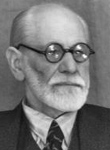 In Modern Man in Search of a Soul, Carl Jung explains the primary differences between his theories and those of Sigmund Freud:
In Modern Man in Search of a Soul, Carl Jung explains the primary differences between his theories and those of Sigmund Freud:
I am no opponent of Freud’s; I am merely presented in that light by his own short-sightedness and that of his pupils. No experienced psychotherapist can deny having met with dozens of cases at least which answer in all essentials to Freud’s descriptions. By his avowal of what he has found in himself, Freud has assisted at the birth of a great truth about man. He has devoted his life and his strength to the construction of a psychology which is a formulation of his own being.
Our way of looking at things is conditioned by what we are. And since other people are differently constituted, they see things differently and express themselves differently. Adler, one of Freud’s earliest pupils, is a case in point. Working with the same empirical material as Freud, he approached it from a totally different standpoint. His way of looking at things is at least as convincing as Freud’s, because he also represents a well-known type. I know that the followers of both schools flatly assert that I am in the wrong, but I may hope that history and all fair-minded persons will bear me out.
Both schools, to my way of thinking, deserve reproach for over-emphasizing the pathological aspect of life and for interpreting man too exclusively in the light of his defects. A convincing example of this in Freud’s case is his inability to understand religious experience, as is clearly shown in his book: The Future of an Illusion. For my part, I prefer to look at man in the light of what in him is healthy and sound, and to free the sick man from that point of view which colours every page Freud has written. Freud’s teaching is definitely one-sided in that it generalizes from facts that are relevant only to neurotic states of mind; its validity is really confined to those states. Within these limits Freud’s teaching is true and valid even when it is in error, for error also belongs to the picture, and carries the truth of a true avowal. In any case, Freud’s is not a psychology of the healthy mind.
A further difference seems to me to consist in this, that I try to free myself from all unconscious and therefore uncriticized assumptions as to the world in general. I say “I try”, for who can be sure that he has freed himself from all his unconscious assumptions? I try to save myself at least from the crassest prejudices, and am therefore inclined to recognize all manner of gods provided only that they are active in the human psyche. I do not doubt that the natural instincts or drives are forces of propulsion in human life, whether we call them sexuality or the will to power; but I also do not doubt that these instincts come into collision with the spirit, for they are continually colliding with something, and why should not this something be called spirit? I am far from knowing what spirit is in itself, and equally far from knowing what instincts are. The one is as mysterious to me as the other, yet I am unable to dismiss the one by explaining it in terms of the other. That would be to treat it as a mere misunderstanding. The fact that the earth has only one moon is not a misunderstanding. There are no misunderstandings in nature; they are only to be found in the realms that man calls “understanding.” Certainly instinct and spirit are beyond my understanding. They are terms that we allow to stand for powerful forces whose nature we do not know.
[There is a] third point of difference between Freud’s views and my own. Because of it I am accused of mysticism. I do not, however, hold myself responsible for the fact that man has, everywhere and always, spontaneously developed religious forms of expression, and that the human psyche from time immemorial has been shot through with religious feelings and ideas. Whoever cannot see this aspect of the human psyche is blind, and whoever chooses to explain it away, or to “enlighten” it away, has no sense of reality. Or should we see in the father-complex which shows itself in all the members of the Freudian school, and in its founder as well, convincing evidence of any release worth mentioning from the inexorable family situation? This father-complex, fanatically defended with such stubbornness and over-sensitivity, is a cloak for religiosity misunderstood; it is a mysticism expressed in terms of biology and the family relation. As for Freud’s idea of the “super-ego”, it is a furtive attempt to smuggle in his time-honoured image of Jehovah in the dress of psychological theory. When one does things like that, it is better to say so openly. For my part, I prefer to call things by the names under which they have always been known.
Excerpt from the C.G. Jung ebook, Modern Man in Search of a Soul